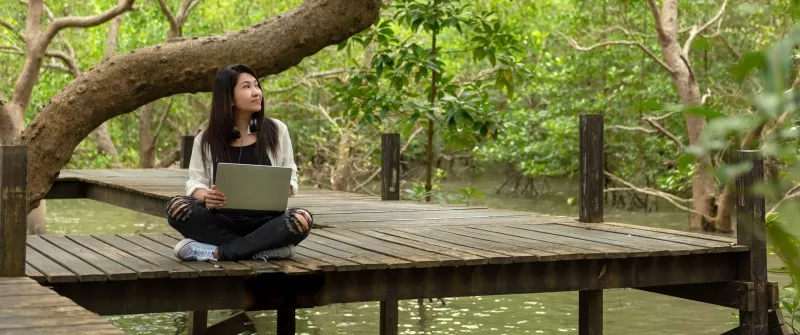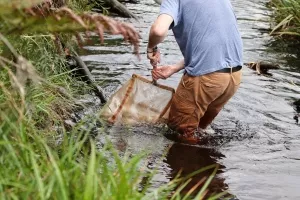The perfect fusion: kinaesthetic learning and environmental education


Different learners have different styles of learning – some gain more from audio stimulants, others visual, but many recognise kinaesthetic learning – the active learning style – as the most effective in memory retention. People often remember things best when they can tie them to physical movement or active discovery. Kinaesthetic learning is not only beneficial for children – adults also tend to learn more when they are actively engaged with the subject matter. Kinaesthetic is often the favoured style for workplace learning activities, forming the bulk of team building initiatives and providing endless opportunities for company away-days.
Adult education subjects can benefit greatly from the kinaesthetic learning style, notably science subjects such as chemistry that requires learners to carry out experiments and biology that encourages learners to explore the natural world. Environmental education champions kinaesthetic learning, with much group work taking place in the field and projects focusing on climate change, natural environments and the eco-system.
Specific environmental education activities well suited to the kinaesthetic learning style
Sustainable produce and planting
With the world facing major challenges with food production and crop retention, there is major emphasis on developing sustainable methods of food production. There is also a focus on tree planting to help balance changes in greenhouse gases and pollution. These activities require physical input, with participants visiting outdoor spaces to verify viability, working the soil and enriching it with vital nutrients, and manually planting trees and building protective fencing for young trees.
Cleaning and clearing waterways

Canals, rivers, ponds, lakes and the ocean are vital to both aqua/marine and land life and their proper maintenance and care is at the forefront of environmental protection. A great physical activity choice is cleaning and clearing waterways and bodies of water. This involves removing rubbish that has accumulated in the area, as well as moving dead and fallen foliage from the banks of ponds and lakes.
Examining the ecosystem
Getting out in the field and just observing the environment, perhaps to learn about the structure or balance of the ecosystem, or to access viability for green developments. This will involve examining flora and fauna, climate, the landscape and anything specific that sets the location apart from others.
Kinaesthetic learning, environmental education and life skills
This educational fusion can support the development of a wide range of skills that will benefit learners throughout their lives, including both their professional and personal lives. Environmental education requires learners to consider the environment and the negative impacts that human activities can have on climate change. To effectively answer issues with the environment, they must be able to utilise problem-solving skills. Taking samples, carrying out experiments and learning to work well as a team all requires a strong problem-solving skill set.

There is no better example of the need for strong team spirit and a cohesive approach than the environment – if we are to challenge climate change and meet issues head-on, every global citizen will have to do their bit. Halting climate change requires a shared world vision and environmental education is essential in promoting that.
Citizenship education enjoys a harmonious relationship with environmental education. Action against climate change requires knowledgeable individuals conscious of their actions and committed to developing a better world – in other words, good citizens. Environmental education naturally incorporates citizenship initiatives. Community learning also feeds in nicely – community groups are often best placed to tackle environmental issues. They know their local environment best and are often some of the first groups to partake in clean up and fundraising activities.
Organisations that facilitate environmental education sessions for adult learners
Sustainable communities – EcoActive
EcoActive is an organisation that educates schools and community groups about the environment and explores how to develop a sustainable community. Specific focus can be given to recycling, composting, growing and clearing strategies and activities.
Family learning – Wildlife Trust at Centre of the Earth

The Wildlife Trust hold group sessions at Centre of the Earth, located 1.5km from central Birmingham – its purpose built environmental hub that teaches visitors about the environment and wildlife. Family learning is well supported and range of resources to use at the centre are provided by the Trust. Community groups will also find sessions appealing.
Communties, families and businesses - Keep Scotland Beautiful
An organisation with presence in every Scottish village, town and city that aims to ensure the environment is protected. Staff from Keep Scotland Beautiful can visit community groups and businesses to help them to understand their own role in environmental awareness and how they can make changes for the better.
Be sure to check regional council websites for more information about environmental education opportunities in your local area.
You might also be interested in:
- Corporate Social Responsibility – Fostering environmental responsibility at work (blog) - as customers and clients look to buy from companies that champion environmental responsibility initiatives, it has never been more important for businesses to foster a green culture at work
- Welsh universities driving climate change initiatives (blog) - explores four universities in Wales that are committed to environmental protection and promote green values
- The BBC and The Open University Oceans poster (resource) - the Open University and the BBC have collaborated to produce a poster to celebrate the release of Blue Planet II, which aims to educate people about marine life, sustainability and the complexity of the marine ecosystem
- Spanish Cork Oaks, Scottish Farmland & Climate Change: learning to plant trees well (blog) - Seona Anderson discusses an Erasmus+ project that aims to increase agroforestry in Scotland - an approach to agriculture that combines forestry and farming and provides organic food that supports the ecosystem and encourages a responsible approach to climate change control
- STEM Learning resources for Adult Community Learning and Development (blog) - in celebration of British Science Week, Alison McLachlan shares her interest of designing and developing adult STEM learning courses and resources




